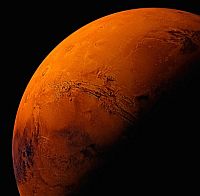 | « Back to article | Print this article |
 India's Mars mission is on track and space scientists are testing the payloads before they are integrated with the satellite.
India's Mars mission is on track and space scientists are testing the payloads before they are integrated with the satellite.
"We are on track for a October launch this year. The payloads are undergoing tests," a senior official of the Department of Space said.
The Mars Orbiter Mission, expected to be launched in mid-October this year, will carry five experimental payloads with a total weight of 14.49 kg.
The Methane Sensor for Mars, which will be capable of scanning the entire Martian disc within six minutes, will weigh 3.59 kg.
Earlier missions to Mars had detected Methane in the thin Martian atmosphere, but the discovery is yet to be corroborated. Methane is known to be released by some microbes as part of their digestive process.
The Mars mission will propel India to the elite club of five nations comprising the US, Russia, Europe, China and Japan which have launched similar missions.
Another instrument -- Thermal Infrared Spectrometer -- weighing 4 kg will be used to map the surface composition of Mars. The Mars Colour Camera has a mass of 1.4 kg, while the Lyman-alpha photometer, weighing 1.5 kg, will measure atomic hydrogen in the Martian atmosphere. The Mars Exospheric Neutral Composition Analyser (MENCA) which will study the Martian atmosphere weighs about 4 kg.
The Mars orbiter will go around the planet once in three days. Prime Minister Manmohan Singh had announced the Mars Orbiter Mission in his Independence Day address last year.
ISRO's trusted warhorse rocket PSLV-XL is expected to launch the mission some time in October from the spaceport Sriharikota.
The satellite is expected to exit Earth's orbit on November 26 and embark on the journey to Mars, which is expected to last for around 300 days. Scientists have drawn up plans to insert the satellite into an orbit around Mars on September 22 next year.